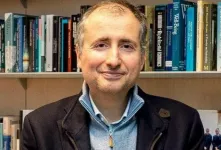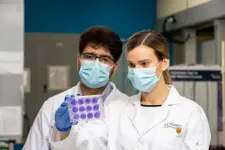Navigating uncertainty: Why we need decision theory during a pandemic
Modern decision theory can assist policymakers in critical times such as the COVID-19 crisis, argue Bocconi University's Massimo Marinacci and Valentina Bosetti in a paper coauthored by Nobel laureate Lars Peter Hansen
2021-01-22
(Press-News.org) During a pandemic, decisions have to be made under time pressure and amid scientific uncertainty, with potential disagreements among experts and models. With COVID-19, especially during the first wave, there was uncertainty about the virus transmissibility, the disease severity, the future evolution of the pandemic and the effectiveness of the proposed policy interventions, such as wearing face masks or closing schools. Together with a group of epidemiologists and economists, including the Nobel Prize winner Lars Peter Hansen, Bocconi professors Massimo Marinacci, AXA-Bocconi Chair in Risk, and Valentina Bosetti investigated how modern decision theory can help policymakers navigate through the uncertainty that characterizes this pandemic and possible future ones.
More in detail, they interpret the problem of a policymaker taking policy decisions about the COVID emergency as happening in an environment characterized by three layers of uncertainty: uncertainty about models, across models, and within models. Uncertainty about models relates to the fact that models are, by design, simplifications of more complex phenomena, and hence are necessarily misspecified, at least to some extent. For instance, they might not include some variables that are instead important. Uncertainty across models encompasses both the proliferation of different models and the fact that the parameters of each single model are unknown. In the COVID-19 context, these parameters include the effective reproduction number (the now famous Rt index) and the disease latent period. Finally, uncertainty within models accounts for the fact that - apart from deterministic models, that however are often oversimplistic - even a fully specified model has uncertain outcomes. For example, when flipping coins or rolling dice, we have full knowledge of the probability model but still cannot anticipate the outcome, because the latter is random.
In front of this complexity, formal decision rules can be of great help. A formal decision problem consists of a set of actions, a set of consequences and a set of environment states, plus a function that associates a consequence to each action-state couple. In the case of COVID-19, the considered actions may be different durations of school closures, while consequences include both the benefits of this kind of action (e.g. reducing infections, hospitalizations and deaths) and its costs (worse education for children, struggles for working parents, etc.) and also depend on the environment state (i.e. the pandemic and economic situation). A formal decision rule is then a function that associates the "best" action to the observed data.
"Various decision rules exist and picking the best one for a particular situation remains a non-trivial problem," says Professor Bosetti, «however this approach can help weed out bad solutions from the debate."
"Policymakers can check their decisions by asking whether they can be justified using a formal decision rule," explains Professor Marinacci. "Used this way, formal decision rules can help policymakers clarify the problem, test their intuition, and avoid reasoning mistakes that have been documented in psychological studies, like confirmation and optimism bias."
"In practical terms, ensuring that policy options are in line with formal decision rules could be achieved by including a decision analyst in the group of advisors. This would assist policymakers not only in accounting for all sources of uncertainty while taking decisions, but also in communicating this uncertainty transparently, either to the citizens, or to a potential investigating committee. Being open about the degree of uncertainty surrounding the scientific evidence used to guide policy choices is a valuable way of retaining public trust and avoiding that single self-described experts over-influence both citizens and policymakers."
INFORMATION:
[Attachments] See images for this press release:

ELSE PRESS RELEASES FROM THIS DATE:
2021-01-22
Loneliness in adults aged 50 and over during the COVID-19 lockdown was linked to worsening depressive and other mental health symptoms, according to a large-scale online study.
Loneliness emerged as a key factor linked to worsening symptoms of depression and anxiety in a study of more than 3,000 people aged 50 or over led by the University of Exeter and King's College London, and funded by The National Institute for Health Research (NIHR) Maudsley Biomedical Research Centre (BRC) .
Researchers had access to data going back to 2015 for participants of the ...
2021-01-22
Researchers from Nanyang Technological University (Singapore), Shanghai Jiao Tong University, and University of Hong Kong published a new paper in the Journal of Marketing that examines why and how charitable organizations can increase donations by soliciting consumers after retailers' price promotions.
The study, forthcoming in the Journal of Marketing, is titled "Do Promotions Make Consumers More Generous? The Impact of Price Promotions on Consumers' Donation Behavior" and is authored by Kuangjie Zhang, Fengyan Cai, and Zhengyu Shi.
Giving Tuesday, a global generosity movement, takes place each year on the Tuesday after US Thanksgiving (immediately after Black Friday and Cyber Monday sales). Charitable donations generally see a big boost on Giving Tuesday. This year, American consumers ...
2021-01-22
The Ganges River - with the combined flows of the Brahmaputra and Meghna rivers - could be responsible for up to 3 billion microplastic particles entering the Bay of Bengal every day, according to new research.
The study represents the first investigation of microplastic abundance, characteristics and seasonal variation along the river and was conducted using samples collected by an international team of scientists as part of the National Geographic Society's END ...
2021-01-22
HAMILTON, ON, Jan. 21, 2020 -- McMaster University researchers have established in lab settings that a novel combination of two forms of immunotherapy can be highly effective for treating lung cancer, which causes more deaths than any other form of cancer.
The new treatment, yet to be tested on patients, uses one form of therapy to kill a significant number of lung tumor cells, while triggering changes to the tumor that enable the second therapy to finish the job.
The first therapy employs suppressed "natural killer" immune cells by extracting them from patients' tumours ...
2021-01-22
A new study exploring the impact of repeated sleep loss during a simulated working week has found that consuming caffeinated coffee during the day helps to minimize reductions in attention and cognitive function, compared to decaffeinated coffee1.
While this effect occurred in the first three-to-four days of restricted sleep, by the fifth and final day, no difference was seen between caffeinated and decaffeinated coffee drinkers. This therefore suggests that the beneficial effects of coffee for people with restricted sleep are temporary1.
It is estimated that over 30% of adult Western populations sleep less than the recommended seven to eight hours on weekday nights and 15% regularly sleep less than six hours2,3. This can ...
2021-01-22
A modelling study suggests that demand for cancer surgery will rise by 52% - equal to 4.7 million procedures - between 2018 and 2040, with the greatest relative increase in low-income countries, which already have substantially lower staffing levels than high-income countries.
A separate observational study comparing global cancer surgery outcomes also suggests that patients in low- and middle-income countries (LMICs) are four times more likely to die from colorectal or gastric cancer (odds of 4.59 and 3.72, respectively) than those in high-income countries (HICs) currently, and that poor provision of care ...
2021-01-22
Since the outbreak of SARS-CoV-2, it has quickly become apparent that children are extremely unlikely to suffer severe COVID-19 illness. Nevertheless, children have had to adjust to the new world of medical staff dressed in personal protective equipment (PPE) in the same way as all other patients. A new study from one of the UK's leading children's hospitals -Alder Hey Children's Hospital in Liverpool - shows that children are not scared by PPE, and can in fact feel reassured by it.
The study was conducted by Drs Charlotte Berwick, Jacinth Tan, Ijeoma Okonkwo and their ...
2021-01-22
The sight of healthcare workers wearing personal protective equipment (PPE) to protect against transmission of SARS-CoV-2 is something the world has become accustomed to. However, a new study analysing the impact of PPE staff shows that the number and variety of issues they experience increases as their time in PPE without a break increases, ranging from tiredness and headaches in the first hour to nausea, vomiting and dizziness as they head towards four hours continuously in PPE.
The study is by Dr Tom Hutley, Dr Lynsey Woodward and Mr Joshua Berrington based at the University Hospitals Dorset NHS Foundation Trust, Bournemouth, UK, and was presented at the Winter Scientific ...
2021-01-22
The results of a randomised clinical trial with the longest follow up to date show that metabolic surgery is more effective than medications and lifestyle interventions in the long-term control of severe type 2 diabetes.
The study, published today in The Lancet, also shows that over one-third of surgically-treated patients remained diabetes-free throughout the 10-year period of the trial. This demonstrates, in the context of the most rigorous type of clinical investigation, that a "cure" for type 2 diabetes can be achieved.
Researchers from King's College London and the Fondazione Policlinico Universitario Agostino Gemelli IRCCS, Rome, Italy report the 10-year outcomes of a trial that compared metabolic surgery with conventional medical and lifestyle interventions in patients ...
2021-01-21
Food insecurity spiked among residents living in two predominantly African American neighborhoods during the first weeks of the coronavirus pandemic, far outpacing food insecurity observed among the general U.S. population during the same period, according to a new RAND Corporation study.
Following residents of two Pittsburgh low-income African American neighborhoods characterized as food deserts since 2011, the study found that the pandemic increased the number of people facing food insecurity by nearly 80%.
Similar to United States national trends, food insecurity among residents had been improving consistently since 2011. ...
LAST 30 PRESS RELEASES:
[Press-News.org] Navigating uncertainty: Why we need decision theory during a pandemic
Modern decision theory can assist policymakers in critical times such as the COVID-19 crisis, argue Bocconi University's Massimo Marinacci and Valentina Bosetti in a paper coauthored by Nobel laureate Lars Peter Hansen


